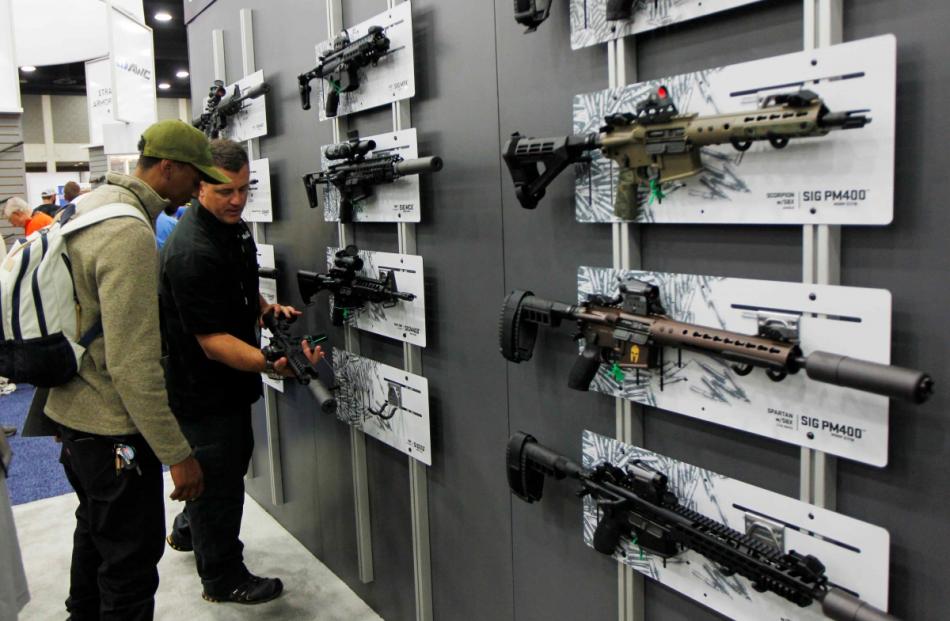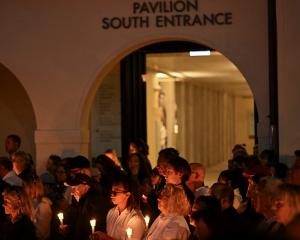The US Senate's strongest push in years to tighten gun controls appears likely to fall short, but lawmakers are trying to forge a compromise that might keep firearms away from people on terrorism watch lists.
The deadliest mass shooting in modern US history has spurred quick action in Congress, but none of Monday's bills (local time) are expected to achieve the 60 votes needed for passage in the 100-seat chamber, as Republicans and Democrats have not been able to reach consensus.
Republicans and Democrats have offered four separate proposals to expand background checks on gun buyers and curb gun sales for individuals on terrorism watch lists after last week's massacre in an Orlando nightclub.
Senator Chris Murphy, who led fellow Democrats in 15 straight hours of floor debate last week to demand action on gun control, acknowledged that an amendment of his to require background checks for gun sales may not win approval in the Republican-controlled Senate.
"I admit that the background checks bill is going to be tough to get 60 votes on, but we still have hope that we can get Republicans to support the bill stopping terrorists from getting weapons," Murphy, from Connecticut, told ABC's "This Week" on Sunday.
While gun control efforts failed after mass shootings at an elementary school in Newtown, Connecticut in 2012 and a conference center in San Bernardino, California in 2015, some senators see resistance to gun restrictions softening as national security looms larger in the debate.
The Orlando gunman, Omar Mateen, pledged allegiance to the militant group Islamic State as he killed 49 people in a gay nightclub.
A Reuters/Ipsos poll conducted last week found that 71 percent of Americans favor at least moderate regulations and restrictions on gun sales. That compared with 60 percent in late 2013 and late 2014.
Senior Senate aides on Monday left open the possibility of other votes later in the week on unspecified gun control proposals.
Some Republicans pinned hopes on a compromise proposal by Senator Susan Collins, a Maine Republican, which was not one of the four bills being considered on Monday.
Her plan would restrict gun purchases to a narrow group of suspects, including those on a "no-fly" list or a "selectee" list of people who require additional screening at airports. .
Senator Jeff Sessions, a conservative Republican from Alabama, said he is willing to consider Collins' plan.
"I am open to the details," Sessions told CNN. "I agree that, somehow, some way, we should be able to make this work."
A Democratic congressman on Monday called on House of Representatives Speaker Paul Ryan, a Republican, to schedule a vote on a 'no fly, no buy' bill this week before lawmakers go on vacation on Friday.
"Paul Ryan has an obligation to at least put that up for a vote. And I believe that if he did, it would pass," U.S. Representative Steve Israel of New York told CNN.
To become law, a bill has to be passed by both chambers in Congress and then signed by President Barack Obama.
Congress has not passed new gun restrictions since a 2007 expansion of the government's automatic background check database to include individuals with a history of mental illness and felons. The United States has more than 310 million weapons, about one for every citizen.
Separately, the Supreme Court on Monday rejected a challenge by gun rights advocates, leaving in place gun control laws in New York and Connecticut that ban assault weapons like the one used in last week's massacre in Florida.
The issue has also moved to the forefront of the debate ahead of the November 8 US election.
Republican presidential candidate Donald Trump on Monday sought to clarify comments he made about guns following the Orlando shooting, saying in a tweet that he meant security staff - not patrons - at the gay nightclub should have been better armed.
'National security issue'
Following the Orlando shooting, Democrats have been pushing a new tactic to try to shift the gun control debate to a national security issue, in part to make new restrictions more appealing to Republicans.
Senator Dianne Feinstein, who is pushing a major Democratic proposal to give the federal government broad latitude to deny gun purchases to those under suspicion of terrorism links, said her plan "would have picked up Omar Mateen," who had once been on a watch list.
Some Republicans said the plan goes too far and may trample on the constitutional rights of those wrongly suspected.
"Republicans and Democrats should be looking at the rise of ISIS and its ability to communicate with and influence disturbed individuals domestically, which is a national security issue that has not gotten the attention it deserves," said Republican political strategist Rory Cooper.
Likewise, Democrats said that Republican Senator John Cornyn's proposal to require court approval within three days for the government to ban an individual's attempt to buy a gun over terrorism suspicions does not go far enough. A similar bill failed last December.
National Rifle Association Executive Vice President Wayne LaPierre, who has opposed Democratic gun control proposals, has said he supports Cornyn's plan because it "codifies" current practices on terrorism suspicions.
Other proposals that will get votes on Monday are Murphy's plan to expand background checks to online sales and those at gun shows and Republican Senator Charles Grassley's proposal to boost funding for the National Instant Criminal Background Check System and add mental health considerations to the checks.













